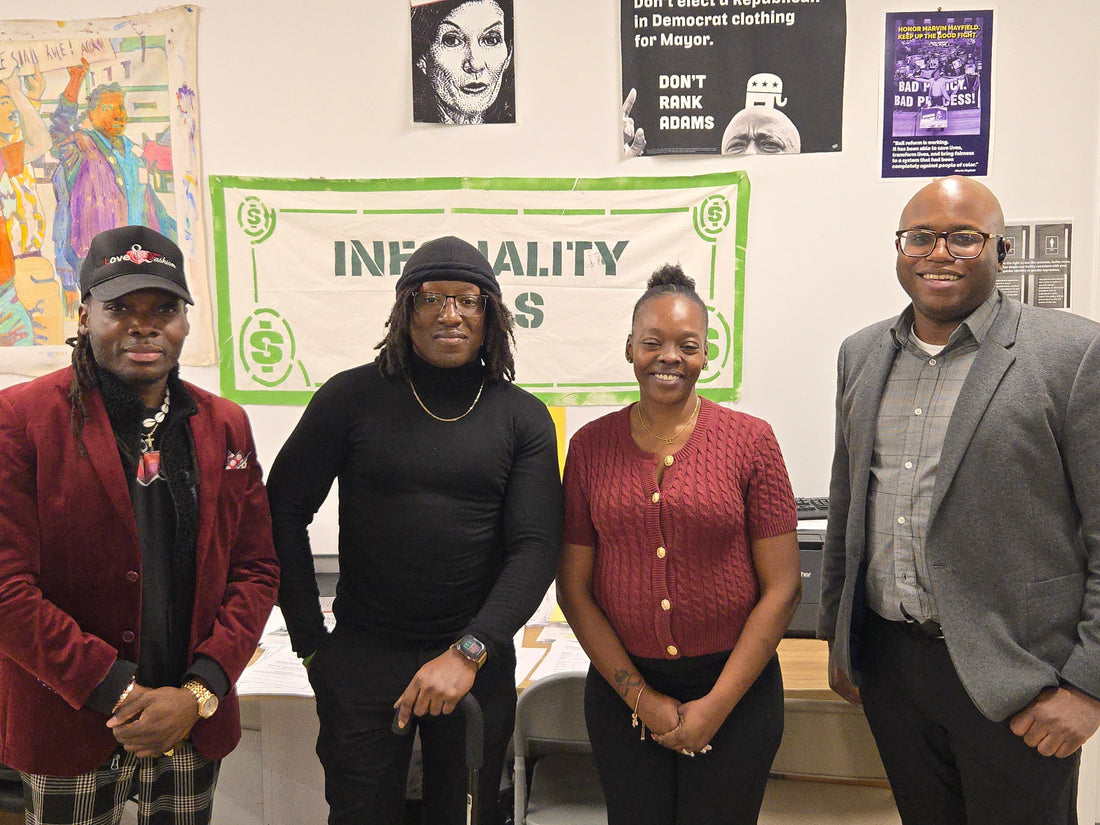
Uniting for Sickle Cell: Community Efforts to Restore Essential Funding
Share

Tray - Zaron - Chantay - David Alexis
On February 27, 2025, a coalition of advocates gathered to address the critical issue of funding cuts affecting sickle cell disease (SCD) programs and broader healthcare services. Tray, owner of LOVE & FASHION ENTERTAINMENT—which donates 5% of its profits to sickle cell awareness—and representative of CANDICES SICKLE CELL FUND (CSCF), joined forces with David Alexis, a community organizer and father of two and husband to a sickle cell warrior, who is challenging the long-standing incumbent for the New York State Senate seat in District 21. Their mission: to combat the alarming 19% reduction in Article 6 funding, a legislative provision essential for public health services.

David Alexis.
Article 6 of the Public Health Law provides state aid for general public health work, reimbursing local health departments for core services. Recent funding cuts have led to over $62 million in lost resources for New York City alone, severely impacting programs that serve vulnerable populations, including those affected by SCD. This reduction jeopardizes essential services, such as training for teachers on Individualized Education Programs (IEPs) and 504 plans, which are vital for accommodating students with SCD. These students often require additional support, including frequent hydration breaks, extended time for assignments due to hospitalizations, and the ability to recognize signs of medical distress.
Community-based organizations (CBOs) and nonprofits are indispensable in providing comprehensive support to individuals living with sickle cell disease (SCD). These organizations extend their reach beyond clinical settings, offering essential out-of-hospital services that address both the physical and emotional needs of patients. However, the sustainability of these vital services is heavily reliant on consistent and adequate funding.


The Role of Community-Based Organizations and Nonprofits
Organizations like CANDICES SICKLE CELL FUND (CSCF) exemplify the profound impact that dedicated CBOs can have on the SCD community. Recognizing the debilitating nature of the disease, CSCF offers services such as meal delivery for patients recently discharged from the hospital who may lack the strength to cook or shop for themselves and their families. Additionally, CSCF organizes support groups, advocates for policy changes within hospital systems, and facilitates staff training to improve patient care. These initiatives are crucial in bridging the gap between clinical treatment and everyday living, ensuring patients receive holistic care.
LOVE & FASHION ENTERTAINMENT is deeply committed to supporting the sickle cell community through various philanthropic efforts. In addition to donating a portion of their profits to sickle cell awareness and providing emotional support to patients, they offer financial assistance to high school graduates aiming to further their education or entrepreneurial pursuits. This support is specifically directed towards individuals and groups dedicated to giving back to the sickle cell community. By investing in these future leaders, LOVE & FASHION ENTERTAINMENT fosters a cycle of empowerment and advocacy, ensuring that those affected by sickle cell disease have the resources to make meaningful contributions and drive positive change within their communities.
The Imperative for Sustained Funding
The invaluable services provided by these organizations and businesses underscore the critical need for sustained and targeted funding. Financial support enables CBOs and nonprofits to maintain and expand their programs, directly impacting the quality of life for SCD patients. Without adequate funding, many of these essential services risks being scaled back or discontinued, leaving a vulnerable population without necessary support.
In light of recent funding challenges, such as the 19% reduction in Article 6 funding, it is imperative that policymakers, private donors, and the broader community recognize and address the financial needs of these organizations. Investing in CBOs and nonprofits not only enhances patient outcomes but also alleviates the broader healthcare system by reducing hospital readmissions and promoting patient well-being.
By prioritizing funding for community-based organizations and nonprofits, we affirm our collective commitment to supporting individuals with sickle cell disease, ensuring they receive comprehensive care that extends beyond hospital walls.
The healthcare sector is also reeling from the impact. Hospitals face challenges in providing specialized training for nurses and doctors in protocols tailored for SCD patients. Without proper training, medical professionals may not administer necessary treatments—such as hydration, IV fluids, oxygen therapy, and specific pain management strategies—promptly, increasing the risk of severe complications like ischemia, which can cause irreversible organ damage.
In solidarity, Tray and Alexis, accompanied by advocates Zaron and Chantay, visited Access Health and New York Communities for Change. These organizations are at the forefront of initiatives aimed at uniting diverse communities—including but not limited to Moors, African, Latin American, Haitian, Asian, Caribbean, Middle Eastern, European, and Jewish populations—to address systemic healthcare disparities. Their collective efforts underscore the belief that a unified community can drive meaningful change and secure a brighter future for all.
The coalition's advocacy is timely, especially in light of recent legislative developments. Governor Hochul has signed legislation aimed at improving healthcare access for New Yorkers, with over $4.6 million allocated to programs designed to expand access and eliminate disparities. However, advocates argue that more targeted funding is necessary to address the unique challenges faced by the SCD community.
The day's events culminated in a renewed call to action for policymakers, healthcare providers, and community members to recognize the critical need for restored and enhanced funding for medical programs. By doing so, they can ensure that individuals living with SCD receive the comprehensive care and support they deserve, paving the way for a more equitable healthcare system.

